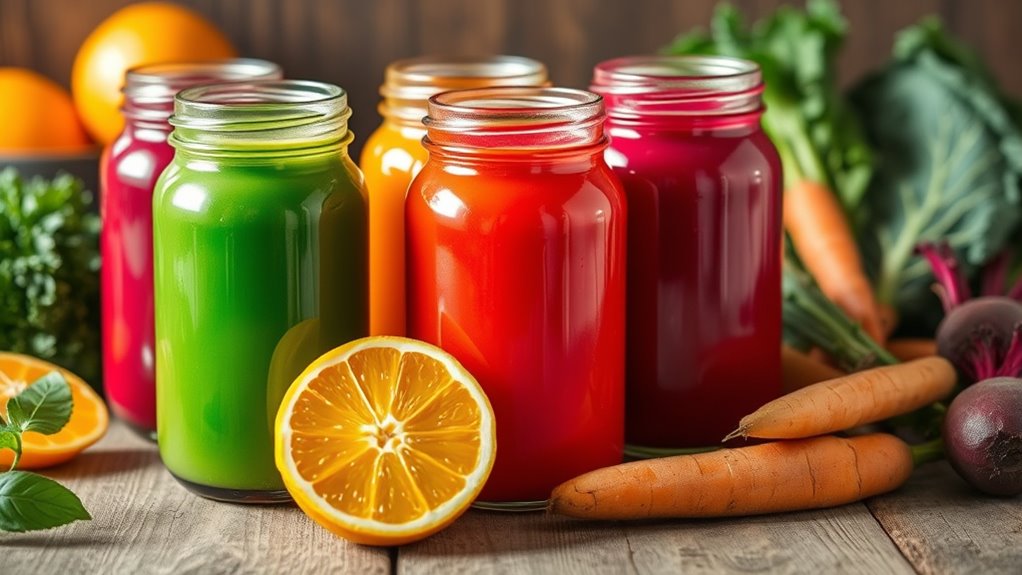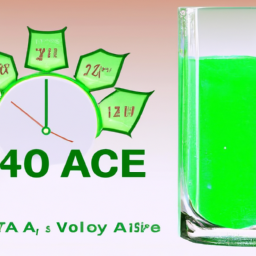Juice cleanses are often marketed as quick fixes for detoxing and weight loss, but many claims are myths. Your liver and kidneys naturally remove toxins, and juice mainly boosts vitamin and antioxidant intake. Short-term weight loss usually comes from water or muscle loss, not fat. Sustainable health comes from healthy habits like balanced eating and exercise. Want to know which facts can truly support your wellness? Keep exploring to find out more.
Key Takeaways
- Juice cleanses increase nutrient intake but do not scientifically detoxify the body’s organs like the liver or kidneys.
- Rapid weight loss from cleanses is mostly water or muscle loss, not fat reduction, and often rebounds.
- Long-term health benefits rely on sustainable habits like balanced eating and regular exercise, not short-term cleanses.
- The effectiveness of juice cleanses depends on ingredient quality and moderation, not on complex or fancy recipes.
- Cleanses are best used as a supplement to a healthy diet, not a quick fix or sole health solution.

Have you ever wondered if a juice cleanse could boost your health and reset your body? Many people turn to juice cleanses with that hope in mind, believing they can jumpstart healthier habits or rid their bodies of toxins. While the idea sounds appealing, it’s important to understand the facts versus the myths surrounding juice cleanses. One of the main reasons people try them is for their detox benefits. These benefits are often touted as a way to eliminate accumulated waste and toxins, leaving you feeling refreshed and energized. But do juice recipes truly have the power to detoxify your body? The truth is, your liver and kidneys already do a great job of detoxifying without needing a juice cleanse. However, incorporating fresh juice recipes into your diet can increase your intake of vitamins, antioxidants, and hydration, which support overall health. This can make you feel lighter and more vibrant, but it doesn’t necessarily mean toxins are being flushed out in the way some claims suggest.
Additionally, the role of contrast ratio in visual clarity is often overlooked in discussions about health and wellness, yet it’s essential in creating an optimal environment for relaxation and recovery. Many myths circulate that a juice cleanse can lead to rapid weight loss or cure chronic health issues. While you might see some initial weight loss, it’s often water weight or muscle loss rather than fat. Once you resume your regular eating habits, the weight tends to come back. Also, juice cleanses are not a cure-all for health problems. If anything, they can sometimes cause side effects like fatigue, dizziness, or irritability, especially if they’re overly restrictive or long-term. It’s a misconception that a juice cleanse is the only way to reset your body. Healthy eating, regular exercise, and proper hydration are more sustainable and effective methods for long-term wellness.
When it comes to juice recipes, many people get caught up in the variety and flavor combinations, thinking they’re essential for success. But the real benefit lies in choosing ingredients that nourish your body—think leafy greens, berries, citrus, and root vegetables—rather than focusing solely on taste. You don’t need complex recipes to enjoy the benefits of fresh juice; simple combinations can be just as effective. The key is moderation and balance. A juice cleanse can be a beneficial supplement to your diet if done carefully and not as a drastic, prolonged fix. It’s best to see it as a way to incorporate more fruits and vegetables into your daily routine rather than a quick fix for health issues. Remember, the most effective way to improve your health is through consistent, balanced habits.
Frequently Asked Questions
Can Juice Cleanses Replace All Meals Permanently?
Juice cleanses shouldn’t replace all your meals permanently. They might serve as a short-term meal replacement, giving your digestive system a break, but they lack essential nutrients for long-term sustainability. Relying solely on juice cleanses can lead to nutrient deficiencies and energy dips. For lasting health, it’s better to include balanced meals with proteins, carbs, and fats rather than using juice cleanses as a permanent solution.
Are Organic Juices More Effective Than Non-Organic?
Think of organic juices as a premium vehicle and non-organic ones as a standard ride. Organic juices often deliver better organic benefits with fewer pesticides and chemicals, making them more effective for health. While non-organic options cost less, they might contain residues that diminish their overall benefits. Choosing organic is like upgrading your ride for a smoother, cleaner journey, ensuring you get the most out of your juice.
How Do Juice Cleanses Impact Athletic Performance?
Juice cleanses can temporarily boost hydration levels, helping your muscles recover faster after workouts. However, they might not provide enough protein or calories for sustained athletic performance. You may notice improved muscle recovery initially, but long-term reliance on juice cleanses could hinder strength gains. To optimize performance, combine juices with a balanced diet rich in proteins and carbs, ensuring your body gets the nutrients it needs for peak athletic output.
Are There Age Restrictions for Doing a Juice Cleanse?
Think of your body as a finely tuned instrument; age restrictions for juice cleanses depend on your unique tune. Generally, if you’re under 18 or over 65, you should consult a doctor before starting, as their guidance helps avoid potential discord. A medical consultation acts like a compass, ensuring your journey is safe and harmonious, no matter your age. Always prioritize professional advice to keep your health in perfect pitch.
Can Juice Cleanses Help With Long-Term Weight Loss?
Juice cleanses may give you a short-term metabolic boost, but they aren’t effective for long-term weight loss. When you rely solely on juice, your nutrient absorption drops, leading to potential muscle loss and slowed metabolism. Sustainable weight loss requires balanced eating habits and regular exercise. While a juice cleanse might jump-start your motivation, it’s not a sustainable solution for maintaining weight loss over time.
Conclusion
So, next time you consider a juice cleanse, remember that what you hear might just be a coincidence. While they can boost your fruit and veggie intake temporarily, true health comes from consistent habits, not quick fixes. Sometimes, the biggest benefits happen when you pay attention to the simple, everyday choices—like choosing water over sugary drinks. After all, it’s no coincidence that lasting health is built on steady, mindful habits rather than fleeting trends.









